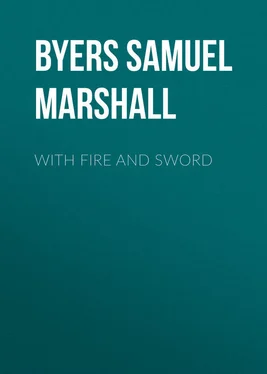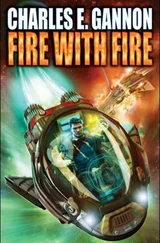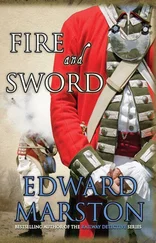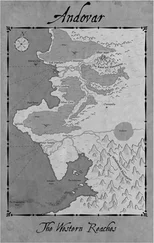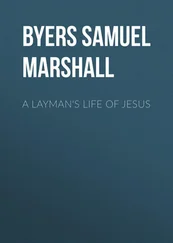Samuel Byers - With Fire and Sword
Здесь есть возможность читать онлайн «Samuel Byers - With Fire and Sword» — ознакомительный отрывок электронной книги совершенно бесплатно, а после прочтения отрывка купить полную версию. В некоторых случаях можно слушать аудио, скачать через торрент в формате fb2 и присутствует краткое содержание. Жанр: foreign_language, foreign_antique, foreign_prose, Историческая проза, на английском языке. Описание произведения, (предисловие) а так же отзывы посетителей доступны на портале библиотеки ЛибКат.
- Название:With Fire and Sword
- Автор:
- Жанр:
- Год:неизвестен
- ISBN:нет данных
- Рейтинг книги:3 / 5. Голосов: 1
-
Избранное:Добавить в избранное
- Отзывы:
-
Ваша оценка:
- 60
- 1
- 2
- 3
- 4
- 5
With Fire and Sword: краткое содержание, описание и аннотация
Предлагаем к чтению аннотацию, описание, краткое содержание или предисловие (зависит от того, что написал сам автор книги «With Fire and Sword»). Если вы не нашли необходимую информацию о книге — напишите в комментариях, мы постараемся отыскать её.
With Fire and Sword — читать онлайн ознакомительный отрывок
Ниже представлен текст книги, разбитый по страницам. Система сохранения места последней прочитанной страницы, позволяет с удобством читать онлайн бесплатно книгу «With Fire and Sword», без необходимости каждый раз заново искать на чём Вы остановились. Поставьте закладку, и сможете в любой момент перейти на страницу, на которой закончили чтение.
Интервал:
Закладка:
I recall now how a prize was once offered by one of our commanders for the head of a certain man among those desperate murderers, a desperado with a band of men that knew no mercy. His troop of riders had ambuscaded almost scores of our soldiers, and innocent farmers who did not happen to like his ways were strung up to trees as unceremoniously as one would drown a kitten. The offered prize of a thousand dollars stimulated certain of our men in taking chances with this beast of the Confederacy, and a corporal of our cavalry learned of the desperado's occasional visits at night to his home, only a dozen miles away from where we were camped. Several nights he secretly watched from a thicket near the cabin for the bandit's return. Once in the darkness he heard a horse's hoofs, and then a man dismounted and entered at the door. The evening was chilly, and a bright fire in the open fireplace of the cabin shone out as the man entered.
The corporal, who had disguised himself in an old gray overcoat, knocked for entrance, and pretended to be a sick Confederate going on a furlough to his home not far away. He was cautiously admitted and given a seat by the open fire. He had no arms, and to the bandit and his wife his story of sickness and a furlough seemed probable enough. The two men and the one woman sat in front of the fireplace talking for an hour. The corporal, with the guerrilla sitting within a few feet of him, thought of the prize, and of his comrades murdered by this man. But what could he do? Suddenly the thought came, "I must kill or be killed." Outside there was only darkness and silence; inside the cabin, the low voices of these three people and the flickering fire.
The corporal glanced about him. There was no gun to be seen that he could seize. The guerrilla's big revolver hung at his belt. While sitting thus, a bit of burning wood rolled out onto the hearth. The guerrilla stooped over to put it in its place. Instantly the corporal saw his chance and, springing for the iron poker at the fireside, dealt the guerrilla a blow on the head that stretched him dead on the cabin floor. In an instant his big jackknife was out of his pocket and in the presence of the screaming wife the brute severed the man's head from his body. Then he left the cabin, mounted his horse in the thicket, and in the darkness carried his ghostly trophy into camp. It is a horrible ride to think of, that dozen miles, with the bleeding head of a murdered man on the saddle bow.
So the awful things went on all that winter in Missouri. As for myself, I was tramping about as a corporal, helping in a small way to keep the great railroad free from marauders and in possession of the Union army.
I don't know how it happened, but one morning our colonel, who had always treated me with extreme gruffness, though he well knew I did my duties with patriotic zeal, sent for me to come to his tent. I was a little alarmed, not knowing what was about to happen to me. The colonel called me by name as I entered, saluting him cap in hand, and for once he actually smiled.
"Corporal," he said dryly, as if suddenly regretting his smile, "I have noticed that you always did the duty assigned you with promptness. I need a quartermaster sergeant. You are the man."
I was almost paralyzed with astonishment and pleasure. I stood stock still, without a word of gratitude. At last, recovering myself, I explained that I had enlisted expecting to fight, and not to fill some easy position with the trains.
"If I could only be allowed to find a substitute," I ventured to say, "in case of a fight, so I might share the danger with my comrades, I would like the promotion."
Again the colonel tried to smile. "You probably will change your mind; you will find excitement enough," he remarked, dismissing me.
I was hardly installed in my new post when to my surprise I was ordered by the colonel to take a good horse and ride twelve miles across the lone prairies and carry a message to a command at the village of Tipton. Instantly my mind was excited with the hopes of an adventure. I don't know, even now, just why I was selected for the venturesome undertaking. I knew there was scarcely a road and not a house in the whole distance. I knew, too, the whole country was full of murderous guerrillas. But nevertheless I was full of elation. This was the kind of a thing I had hoped for when I enlisted.
Light flakes of snow were falling when, with exultant spirits, I started from the camp. The trip outward proved uneventful, for nothing happened to me on my way. As I was returning, however, at a point halfway across the prairie I was surprised to see a man in gray, probably a guerrilla, ride out of a long slough or hollow to my left and gallop into the road directly ahead of me. He was in complete gray uniform, wore a saber, and had revolvers at his saddle bow. The man glanced back at me, and I saw him reaching for his pistols. "Here comes my first fight in the war," I thought instantly, "out here alone on the prairie." Save my one half-loaded revolver, strapped to my waist, I was unarmed. The stranger, without firing, galloped faster. I, too, galloped faster, the distance between us remaining about the same. Each of us now had a pistol in his hand, but it looked as if each were afraid to commence the duel. If the stranger checked his horse to give him breath, I checked mine. If he galloped again, I, too, put spurs to my animal. Imagining that other guerrillas must be lurking quite near, I was not over-anxious to bring on the engagement, and I suppose the armed man felt much the same way, for he could not have thought that I was in such a place absolutely alone. So neither fired. We just looked at each other and galloped. Finally we approached a little wood, and in a twinkling he turned into a path and was out of sight. I did not care to follow him to his hiding-place just then, and quickly galloped to our camp a few miles off.
Before midnight that night I, with a dozen of my regiment, surrounded the little wood and a cabin secreted in its center. Approaching, we looked into the windows, and, sure enough, there, roasting his feet in front of an open fire, sat my rider of the day. When three of us suddenly entered the house and demanded his surrender he sprang for a rifle that stood like a poker by the fireside, aimed it at me, and shouted "Never! Surrender yourself." A bayonet that instant against his breast brought him to terms, however. There followed a little farewell scene between him and his wife, who poured bottles of wrath on the heads of the "bluecoats," and our captive – my captive – was hurried to the guardhouse at the camp. It had been a perfectly bloodless encounter, but next morning it turned out that I had by chance captured one of the most dangerous guerrillas in Missouri.
CHAPTER II
It was a trifling incident, this capture, compared with the dreadful things I have referred to as going on in Missouri that memorable first year of the Civil War. A great volume would not contain the record of them all. The first dead men I saw while in the army were eight Missouri farmers murdered by guerrillas and left lying in the hot sun and dust at the roadside. The sight moved me as no great battle ever did afterward.
One half of the male population of Missouri was trying to kill the other half. They were not opponents from different far-off sections fighting, but near neighbors, and nothing seemed too awful or too cruel for them to do. How I pitied the women and children who lived in the State in those awful days!
General Sherman's designation of war as "hell" found more confirmation in the dreadful raids, outrages, and murders by Quantrell's guerrillas in Missouri than in the bloodiest battles of the four years' conflict.
Читать дальшеИнтервал:
Закладка:
Похожие книги на «With Fire and Sword»
Представляем Вашему вниманию похожие книги на «With Fire and Sword» списком для выбора. Мы отобрали схожую по названию и смыслу литературу в надежде предоставить читателям больше вариантов отыскать новые, интересные, ещё непрочитанные произведения.
Обсуждение, отзывы о книге «With Fire and Sword» и просто собственные мнения читателей. Оставьте ваши комментарии, напишите, что Вы думаете о произведении, его смысле или главных героях. Укажите что конкретно понравилось, а что нет, и почему Вы так считаете.
